Eating for Metabolic Health

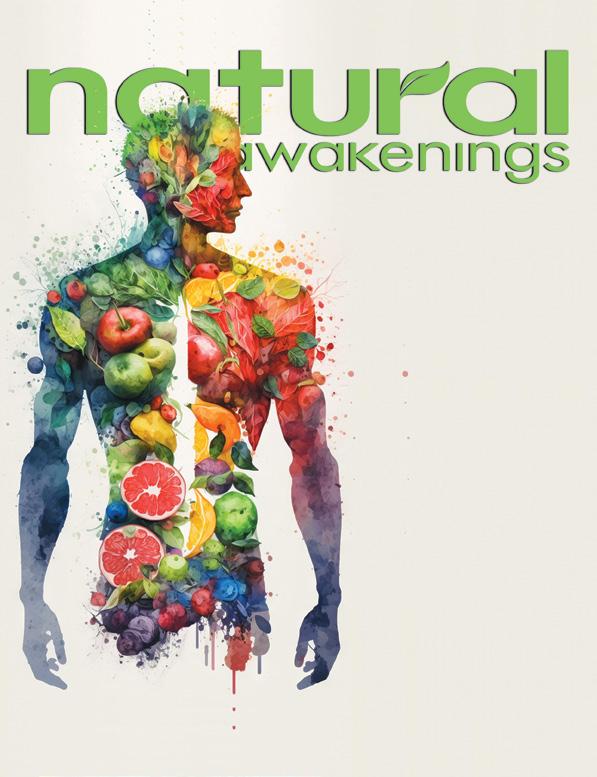
Rocking the Dad Role
Sustainable Summer Barbecues
Benefits of Good Posture
MEN’S HEALTH
HEALTHY LIVING | HEALTHY PLANET FREE JUNE 2023 BUCKS & MONTGOMERY COUNTY, PA EDITION
HOW TO ADVERTISE
To advertise with Natural Awakenings or request a media kit, please contact us at 267-544-9585 or email Publisher@NABuxMont.com. Deadline for ads: the 5th of the month.




EDITORIAL SUBMISSIONS
Email articles, news items and ideas to: Publisher@NABuxMont.com Deadline for editorial: the 5th of the month.
CALENDAR SUBMISSIONS
Submit calendar events online at NABuxMont.com Deadline for calendar: the 5th of the month.
REGIONAL MARKETS

Advertise your products or services in multiple markets! Natural Awakenings Publishing Corp. is a growing franchised family of locally owned magazines serving communities since 1994. To place your ad in other markets call 239-206-2000. For franchising opportunities call 239-206-2000 or email Natural Awakenings@KnoWEwell.com.
10
14
16
18
22
24
2 Bucks & Montgomery County, PA Edition NABuxMont.com
ADVERTISING & SUBMISSIONS
WHAT EVERY MAN WANTS
Vitality at Every Age
Sexual
CONSCIOUS FATHERHOOD
a Better Family
Building
DR. MARK HYMAN on Living Healthy to 100 and Beyond
CONVERTING
TO ENERGY
FOOD
Learning How Metabolism Works
STRAIGHTEN
FEEL
for Good Posture and a Healthy Spine
UP AND
RIGHT Tips
KEEPING EYES SHARP
Holistic Approach to Vision Health
LEAPS AND BOUNDS
Canine Jumpers Injury-Free
Contents DEPARTMENTS 4 news briefs 6 health briefs 8 global briefs 9 eco tip 14 healthy kids 16 wise words 18 conscious eating 22 fit body 24 healing ways 26 natural pet 28 calendar 30 directory 10
Awakenings is a network of natural lifestyle magazine publishers empowering local communities with knowledge, resources and connections to lead healthier lives on a healthy planet.
26
A
26
Keeping
18
Natural
22 9
Joe Dunne, Publisher
The Legacy of Fatherhood
June is our “Men’s Month Issue. Naturally, it falls in the month of Father’s Day—beyond a doubt my favorite holiday of the year. I have been a father for over 53 years and to this day the experience of fathering continues to challenge and reward me with dividends way beyond the material world.

Nothing in the world moves me more than a dedicated dad. When I look at fathers today, the younger generation especially, it makes me proud to know fatherhood has evolved, that men have come so far and we are now able to reap the rewards of the involved father.
It seems to me that parenting, my contribution as a father, is the most important legacy of my life. I am extremely proud that our contributions as men to our children, to our families and to our legacy has evolved Fathers—be proud. Happy Father’s day and keep growing..
Publisher Joe Dunne
Publisher@NABuxMont.com • 908-405-1515
Managing Editor Kathy Tarbell Kathy@NaturalAwakeningsNJ.com
Contributing Writer Kiki Powers
Layout Design Melanie Rankin
Sales & Marketing Joe Dunne
Digital Marketing Kristy Mayer
Accounting/Billing Asta Dunne Asta@NaturalAwakeningsNJ.com
CONTACT THE PUBLISHER
Joe Dunne
Cell: 908-405-1515 • Fax: 239-920-5147
Publisher@NABuxMont.com NABuxMont.com

Visit our Facebook page for the latest health updates and information, or to post your events and comments.
Natural Awakenings BuxMont
NATIONAL TEAM
CEO Kimberly B. Whittle
National Editor Sandra Yeyati
Editor Brooke Goode
Copy Editor/Proofreader Melanie Rankin
Design & Production Gabrielle W-Perillo
National Advertising Lisa Doyle-Mitchell
CONTACT US
Natural Awakenings Publishing Corporation 350 Main Street, Suite 9B Bedminster, NJ 07921
Ph: 239-206-2000
NaturalAwakenings@KnoWEwell.com
© 2023 by Natural Awakenings. All rights reserved. Although some parts of this publication may be reproduced and reprinted, we require that prior permission be obtained in writing.
Natural Awakenings is a free publication distributed locally and is supported by our advertisers. Please call to find a location near you or if you would like copies placed at your business.
We do not necessarily endorse the views expressed in the articles and advertisements, nor are we responsible for the products and services advertised. The content herein has not been evaluated by the Food and Drug Administration and is not meant to treat, diagnose, cure or prevent any condition. Statements are the opinion of the author/speaker. Check with a healthcare professional regarding the appropriate use of any treatment.
Natural Awakenings Magazine is ranked 5th Nationally in CISION’S

Natural Awakenings is printed on recyclable newsprint for the environment.

3 June 2023
HEALTHY LIVING HEALTHY PLANET BUCKS / MONTGOMERY EDITION
Top
® 2016
10 Health & Fitness Magazines
publisher letter
“Dads are most ordinary men turned by love into heroes, adventurers, storytellers, and singers of song.”
– Unknown
of

Leave Fear Behind at Heart Flowers Healing Therapies


Justnorth of Doylestown is a unique healing therapy practice. For more than 35 years Linda Lemire, LMT, CST and founder of Heart Flowers Healing Therapies, has offered an extensive range of therapeutic options in a lovely, bucolic farm setting, beginning with advanced CranioSacral Therapy (CST), a gentle, non-invasive, hands-on healing modality that focuses on the wave-like rhythmic pulse that goes through the entire body. The goal of CST is to help get rid of restrictions in this system to improve the functioning of the central nervous system. Through highly tuned intuitive touch, Lemire senses the restrictions within the client and integrates additional therapies as needed into each session for maximum benefit.
“Any type of alternative therapy can be kind of scary, but in these trying times, it is more important than ever to be healthy—emotionally, physically and spiritually. We are extremely sensitive to your fears and uncomfortable feelings around trying something new,” shares Lemire. “Many people come in finally as a last resort when all avenues have been exhausted; however, you will only feel better at Heart Flowers. If your fear is holding you back, please take that first step. We promise it gets much easier after that.”
The pastural setting of the farm (complete with cows) offers a great break from the hubbub of daily life. Business hours are also relaxed to more easily fit into busy schedules. Call today to begin your journey to improved well-being.
Location: 713 Kellers Church Rd., Ottsville (Bedminster Township). For more information, call 215 -534-6138 or email llemire@comcast.net. See listing, page 31.
4 Bucks & Montgomery County, PA Edition NABuxMont.com Directory
Advertisers Center for Natural Healing 19 Dan McMeans 5 Dr Anna Calbeca - Julva 25 Eco Loka 11 Full Circle Energy Therapies 11 Gapin Institute 17 Green Meadow Burial 23 Heart Flowers Healing Therapies 30 Journey to the Self 31 Lanap & Implant Center of Pennsylvania 13 Lachman and Associates 30 Mad Lavender Farm 4 Marcelle Pick 25 Men’s Wellness Series 21 RegeneSpine 32 Step Into Joy Healing Arts 9 The Feel Good Again Institute 17 The Hair for Life Center 27 Whole Body Yoga Studio 30
part of our community! Let our advertisers know you saw them in Natural Awakenings! news briefs
Thank you for being
Linda Lemire
Dan McMeans Mind, Body and Spirit Advisor
Depression can be the result of intense and prolonged periods of stress, trauma, low self-esteem, doubt or an accumulation of fear. These energies must all be addressed by an energy healer or seen by a doctor, counselor or therapist.


One way to reset your mind is by focusing on what you absorb because what you absorb is what you become. As Jesus said, “As above, so it is below. As in Heaven, so is on earth.” Meaning you’re capable of moving mountains, and nothing is impossible for you to achieve when you believe in yourself and your higher soul.
It’s important to explore the vastness of your mind to believe you can succeed at new levels of attainment and excellence to fulfill your life’s purpose. It is significant to point out that as you read more positive content, it will help you challenge your fears and help you expand your mind.
Then you can think and wonder with boundless imagination. This helps you create ideas that can only be a result of being free of fear. Ideas that can reverberate and ripple through and influence another person’s energy in a positive way and would help you heal your own depression.
Because this is how God’s Universe Works. When faced with an obstacle, you cannot second guess yourself and try to move that obstacle. You must absorb the powers of believing in yourself for you to propel and set in motion your faith and the energies that reside in you and in the universe to help you achieve your goals.
As Buddha said, “Our life is shaped by our minds, we become what we think.”
Dan McMeans can help you explore your fears, expand your mind, and lead a more fulfilling life. Call 267-570-9042 to begin your personal journey. See ad, below.


WHAT IS PRANIC






Pranic Healing influences your natural life force to bring about healthier living body. Pranic Healing is a method of healing that uses the body’s energy fields and the life-force energy known as prana, which is used to help heal the mind, body, spirit.

WHAT IS REIKI?



Reiki dates back to 770 AD, and was rediscovered in 1922 when Dr. Usui who climbed Mount Kurama in Kyoto City in a Buddhist Temple where he discovered the ancient healing techniques and symbols of Reiki.

5 June 2023
Dan McMeans Pranic Can Treat Possible Malignant Tumors, Pneumonia, Stress, Depression & Sports lnjuries. PRANIC HEALER & REIKI CONSULTATION
HEALING?
PRANIC HEALING “My experience
DAN MCMEANS Speaking Engagements available on: All Things Are Possible! 267-570-9042 hopeforyou1978@yahoo.com www.holisticpranichealer.com local spotlight
Content
was wonderf
ul!
Dan explained everything to me as the session was going on. I feel like a new person.” Diane Wesoski
Sponsored
WEB EXCLUSIVE at NABuxMont.com! SOCIALLY CONSCIOUS INVESTING
Low Vitamin D Linked to Risk of Death

A new study published in Annals of Internal Medicine determined that vitamin D deficiency increases mortality risk. The findings were based on a survey of the vitamin D levels and genetic data of more than 300,000 people aged 37 to 73 that participated in the UK Biobank, a large-scale cohort study that began in 2006. Almost 19,000 deaths from all causes, as well as from specific causes such as cardiovascular disease, cancer and respiratory illnesses, were recorded through 2020.
Researchers discovered that the risk of death decreased steeply with increasing concentrations of vitamin D, until reaching 50 nanomoles per liter (nmol/L). The odds of death from all causes were estimated to increase by 25 percent for participants with vitamin D levels of 25 nmol/L, compared to those with 50 nmol/L.
Rise in Children With Autism
New Insights on Water Consumption Requirements

We have been conditioned to believe that eight glasses of water are required each day, but new research published in Science found that daily water needs vary based on numerous factors. Researchers studied 5,604 people aged 8 to 96 from 23 countries, measuring their water turnover—the amount of water lost and replaced each day. They found that for most healthy adults, drinking eight cups of water a day is unnecessary because water needs vary depending on age, sex, body size, physical activity level, athletic status, pregnancy, socioeconomic status and environmental characteristics such as latitude, altitude, air temperature and humidity. People that lived in less developed countries had higher water turnover than people from developed countries. While hydration should be prioritized, most people that pay attention to their bodies and drink when thirsty are likely drinking enough water.
In March, the U.S. Centers for Disease Control and Prevention(CDC) released updated statistics on the rate of children diagnosed with autism spectrum disorder (ASD), which has been steadily on the rise. One in 36 children was diagnosed with autism by age 8 in 2020, or about 2.8 percent of children, up from one in 44 children in 2018, and one in 150 children in 2000 when the CDC first established the Autism and Developmental Disabilities Monitoring Network to track ASD prevalence in this country.
Autism was 3.8 times as prevalent among boys (4 percent) as girls (1 percent), and for the first time among 8-year-old children, the prevalence was slightly lower among white children than other racial and ethnic groups, which is a reversal of racial and ethnic differences observed in the past. The CDC partially attributes these patterns to improved screening, awareness and access to services.
The report included communities in 11 states that participate in the CDC Autism and Developmental Disabilities Monitoring Network—Arizona, Arkansas, California, Georgia, Maryland, Minnesota, Missouri, New Jersey, Tennessee, Utah and Wisconsin. Children included in this report were born in 2012 and lived in surveillance areas during 2020. ASD prevalence varied from state to state, with Maryland having the lowest and California the highest observed rates.

6 Bucks & Montgomery County, PA Edition NABuxMont.com
health briefs
Fran.Vila/ShutterStock.com
Fran.Vila/ShutterStock.com
Indian Food Images/ShutterStock.com
Smartphones Make Poor Babysitters
Parents are busy people, often juggling multiple commitments. Add a toddler meltdown to the mix, and it is easy to understand why parents may reach for a tablet, smartphone or other screen to calm and occupy the child. A new study published in JAMA Pediatrics found that children pay a price for this strategy.
Researchers at the University of Michigan concluded that the frequent use of mobile devices to calm young children may displace their opportunities for learning emotion-regulation strategies over time. The cohort study involved a sample of English-speaking parents of typically developing children aged 3 to 5. The scientists gathered baseline data at the start of the study, as well as follow-up evidence after three months and six months.

The participating parents used a five-point scale to report how often they used mobile devices to calm upset children. At each follow-up, the child’s executive functioning and emotional reactivity were assessed. The study found that the frequent use of mobile devices for calming young children was associated with increased emotional dysregulation, especially in boys, and included rapid shifts between sadness and excitement, greater impulsivity and sudden mood changes.
Herbs and Spices Promote Gut Health

A 2022 research study published in The Journal of Nutrition suggests that herbs and spices may be unsung heroes in the quest for gut health. The three-period, randomized, controlled-feeding study involved 54 obese or overweight adults aged 30 to 75 with at least one other risk factor for cardiovascular disease, such as elevated glucose or triglycerides.
Participants consumed the same average American diet for four weeks, along with one of three daily doses of spices and herbs—0.5 grams, 3.3 grams or 6.6 grams—which included cinnamon, ginger, cumin, turmeric, rosemary, oregano, basil and thyme. Fecal samples were collected at the start of the study and the end of each diet period.
Researchers determined that consuming 3.3 or 6.6 grams of herbs and spices per day increased levels of the Ruminococcaceae bacteria, a major player in the maintenance of gut health. The highest levels of this beneficial bacteria were observed among those that consumed the highest levels of herbs and spices. The scientists recommend further investigation to identify the metabolic implications of their findings.
Daily Intense Activity Prolongs Life
A new study in the journal Nature Medicine suggests that short bursts of intense movement are associated with a lower risk of premature death. The UK researchers analyzed data from about 25,000 non-exercisers with an average age of 62 that wore movement tracking devices on their wrists.

Vigorous intermittent lifestyle physical activity (VILPA) refers to short, sporadic bursts of exertion done as part of daily living, such as walking very fast while commuting to work or climbing stairs. The scientists found that compared to participants that engaged in no VILPA, those that did just one to two minutes of VILPA three to four times daily exhibited a 38 to 40 percent lower risk of death over the course of seven years. They also noted that just a few minutes of VILPA throughout the day reduced cardiovascular diseaserelated mortality by up to 49 percent.
Similar results were obtained when they analyzed vigorous physical activity in roughly 62,000 participants that exercised regularly. VILPA in non-exercisers appears to elicit similar effects to vigorous physical activity in exercisers, suggesting that VILPA may be a suitable physical activity target, especially in people not able or willing to exercise on a regular basis.
7 June 2023
Ruslan Huzau/ShutterStock.com
Fran.Vila/ShutterStock.com
Fran.Vila/ShutterStock.com
Microplastics Released by Tea Bags
Most mesh tea bags are made of 20 to 30 percent plastic, which can release microplastics and nanoplastics, causing harmful effects for both human health and the environment. In a study published in the journal Environmental Science & Technology, researchers found that one standard tea bag made with plastic released 11.6 billion microplastics and 3.1 billion nanoplastics into a cup of tea. The particles in the tea matched the nylon and polyethylene terephthalate in the original tea bag.
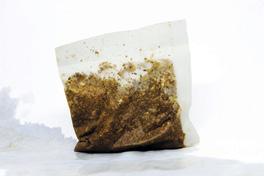
Safer alternatives include steeping loose teas with a stainless steel or silicone tea strainer, or purchasing tea from brands that offer plastic-free teabags. Organic teas may still have plastic in the tea bag, as the packaging is not overseen by organic-certifying organizations.
Open Letter to Pause AI Experiments
A group of leading technology executives, researchers, academics and others from around the world have signed an open letter prepared by the Future of Life Institute calling for a six-month pause on large, humancompetitive artificial intelligence (AI) experiments. As of March 31, more than 1,800 CEOs and 1,500 professors had signed the letter.
“AI labs are locked in an out-of-control race to develop and deploy ever more powerful digital minds that no one— not even their creators—can understand, predict or reliably control,” the letter contends. The authors are concerned that “AI systems are now becoming human-competitive at general tasks.”

While AI systems grow more powerful, there is no natural law or barrier to technical progress. The letter’s authors and signers are asking all AI labs to pause the training of powerful AI systems so that safety protocols can be implemented to ensure the effects of these systems will be positive and the risks manageable. According to the letter, “If such a pause cannot be enacted quickly, governments should step in and institute a moratorium.”
Individuals can view and sign the letter at Tinyurl.com/ AImoratorium.
Artificial Intelligence That Can See With the Mind’s Eye
A team of researchers from the National University of Singapore, the Chinese University of Hong Kong and Stanford
University are using artificial intelligence (AI) to decode human brain scans and determine what a person is picturing in their mind.

Participants underwent brain scans using a functional magnetic resonance imaging (fMRI) machine while looking at more than 1,000 pictures, such as a red firetruck, a gray building and a giraffe eating leaves. This fMRI data was processed by an AI model for roughly 20 hours per patient, as it trained to associate certain brain patterns with the different images.
To test the learning capabilities of the AI model, the subjects were then shown new images while undergoing fMRI. Upon reviewing the brain waves, the AI system generated a shorthand description of each person’s brain state and sketched its best-guess facsimile of the image the participant saw The AI-generated image matched the attributes (color, shape and other details) and semantic meaning of the original image approximately 84 percent of the time. Researchers believe that in a decade the technology could be used on anyone, anywhere.
8 Bucks & Montgomery County, PA Edition NABuxMont.com global briefs
jatupronAdobeStock.com
photo courtesy of Wikipedia
lazaalaexa/ShutterStock.com
Greener Grilling
The aroma of tasty treats sizzling on an outdoor grill evokes memories of laughter among family and friends, picnic tables brimming with colorful foods and the joy of running barefoot in the grass. This year, consider adding a few eco-friendly upgrades to America’s favorite summer tradition.
Fuel Source Matters

The biggest environmental impact from outdoor grilling comes from the fuel source. Here is a handy comparison of the options.
n Charcoal briquettes are little chunks of carbon made by baking wood byproducts, sawdust and other additives. Charcoal burns inefficiently and produces caustic smoke before and after the useful temperature for cooking. To reduce the carbon footprint, consider sustainably sourced bamboo or coconut shells to flame up the barbie.
n Gas grills burn fossil fuels like propane or natural gas. On the other hand, they produce fewer carbon emissions than charcoal, heat more quickly and can be turned off immediately.
n Electric grills may seem more eco-friendly for backyard cookouts, but most electricity is derived from fossil fuels. If the home runs on renewable energy, electric wins. Otherwise, gas grills have a smaller carbon footprint.


n Infrared is the latest in barbecue technology. These pricey outdoor grills can reach high temperatures quickly, use less fuel and cook foods evenly. Because they use electric or gas heating elements that radiate infrared waves to the
food, they generally run for less time than other grills. One drawback is that their high temperatures can easily overcook or burn foods, especially ingredients that don’t need high temperatures, like fish, vegetables and other seafood.

Cleaning Is Paramount
Regardless of the fuel source, it is important to keep the grill free of grease and food particles to prevent more smoke. When the grill is still warm, clean the grates with a wire brush. If grates are already cool, scrub with baking soda and water.
Caramelized Fruits and Vegetables
Burgers and ribs may be synonymous with traditional cookouts, but the modern barbecue menu isn’t all about meat. Recipes abound for grilled veggies and fruits that lend a delicious smoky and caramelized flavor to these nutritious foods. Embrace the appeal of slightly charred corn on the cob, browned portobello mushrooms and grill-marked pineapple. If meat-free burgers won’t please the crowd, look for certified organic, grass-fed and locally raised meats.
9 June 2023 You Are Not Broken! You have the power to heal and You don’t have to do it alone. Step Into Joy Healing Arts LLC A journey of self-discovery and healing Joan Summers Trauma Professional Gestalt Life Coach & Reiki Master (267) 272-9343 joan@stepintojoyhealingarts.com www.StepIntoJoyHealingArts.com Gestalt Life Coaching Equine Gestalt Coaching Intuitive Reiki
RossHelen/ShutterStock.com
eco tip
WHAT EVERY MAN WANTS SEXUAL VITALITY AT EVERY AGE
 by Carrie Jackson
by Carrie Jackson
10 Bucks & Montgomery County, PA Edition NABuxMont.com
Allistair F/peopleimages.com/AdobeStock.com
For men, sexual health is a key, but often overlooked, component of overall wellness. A man in optimal physical shape is able to fully enjoy and participate in sexual activity with an active libido and the ability to sustain an erection. Poor sexual health can lead to depression, prostate cancer, erectile dys function and other troublesome symptoms and conditions.
Fortunately, male sexual function is better understood medical ly than ever before, and it is more common for men to talk with their doctors and other professionals about topics that seemed taboo not that long ago. New technology is making it easier to diagnose and treat common problems, and it is widely understood that physical, neurological, hormonal, interpersonal and mental factors all play into sexual wellness. By taking a proactive and holistic approach to their overall wellness, men can enjoy a robust sex drive and performance long into their later years.
Maintaining Libido and Energy







Eric Plasker, a licensed chiropractor and author of The 100 Year Lifestyle, attests that sexual health does not have to decline with age, and men can proactively counter that myth with mindful lifestyle choices. “If you’re aging in a healthy manner, your libido does not have to decline. By taking part in activities you find fulfilling and nurturing your mind, body and spirit, your sexual energy can stay naturally high,” Plasker explains.
He recommends that people take an energy inventory to assess which activities and lifestyle choices are serving them. “Make a list of all the things you do that help you gain energy and those that drain your energy. This includes the food you eat, hobbies, habits, even people you spend time with. Then see how you can turn the drainers into gainers. For example, if driving in traffic makes you angry, put on relaxing music and do deep breathing exercises to shift yourself into a more positive state. These shifts will make you more energetic, stronger, more passionate and present with your partners, and you’ll have more energy to be sexual and loving,” he says.
Sexual health depends on a healthy nervous system, and maintaining a balanced flow of hormones and neurotransmitters is essential for proper neurological function. According to Plasker, disease, inactivity and inflammation—especially in the lumbar spine and sacroiliac joints—can cause a communication breakdown.
“Blockages in the nervous system flow can cause disruption to the sexual organs and lead to a compromised libido,” he explains. “Chiropractic adjustments, combined with regular exercise, will help raise cortisol, reduce stress and open up these pathways in the body. I recommend that patients find an activity they enjoy, such as swimming or tennis, so it becomes an enjoyable part of their routine,” Plasker says.
Optimizing Hormones

According to Tracy Gapin, a board-certified urologist in Sarasota, Florida, strong sexual health and desire is a window to overall


Full Circle Energy Therapies
Do you need energetic support on your healing journey? This heart-centered approach helps empower individuals to gently peel back layers so they may radiate their true essence and vibrationally align with the life they deserve.

Giving New Meaning to Head in the Clouds, Feet on the Ground.
Featured Services
Personalized Energy sessions
(In person and distance for people & pets) Group Facilitated Breathwork, Sound Healing Transformation Coach

Deep Healing is Our Right. Call today for free consult.
Lori Hoff
Energy Practitioner, Teacher & Coach

1105 Taylorsville Rd., Washington Crossing, PA 908-268-7169 call/text

feelslikesunshine124@gmail.com















FullCircleEnergy.net

IG: fullcircleenergy FB: fullcircleenergytherapies
products and ditch the plastics! We also sell beautiful containers and handcrafted items from local artisans.



10% Off First Purchase

Recycling is good. Reducing and reusing is better.

11 June 2023
Eco Loka Be part of the refill revolution & movement to reduce plastics. No one can do everything, but everyone can do something. 23 Race St., Frenchtown • EcoLoka.shop 908-268-7430 (text is best) • Ecolokanj@gmail.com Refill your own containers with our all-natural soaps, cleaners, detergents and eco-friendly, sustainably sourced beauty
health. He helps patients reach their sexual potential with a combination of sciencebased medicine and holistic practices. “The body is one connected system, and great sexual function is an indication that your body is optimized,” he advises.

While testosterone is widely known to affect sex drive, Gapin looks at the interplay of a variety of other hormones, too. Hormone optimization, testosterone therapy and peptide therapy, which utilizes the body’s own amino acids to increase hormone levels, are non-invasive outpatient tools that men can use to analyze and optimize their sex drive.
“The body produces over 50 hormones, which all contribute to regulating biological processes,” he explains. “Low testosterone can lead to weight gain, anxiety, erectile dysfunction and other serious health issues, including diabetes, obesity, metabolic syndrome, osteoporosis and cardiovascular disease. Men want to optimize their thyroid and DHT [dihydrotestosterone] levels, both of which can lower the sex drive when compromised. Vitamin D helps regulate the gut, which controls the health of the entire body. Neurotransmitters, which help release feel-good endorphins such as serotonin and dopamine, are made in the gut and can affect depression, anxiety and other issues that lower libido.”
Gapin stresses that it is more important to think about “optimal” levels of hormones instead of “normal” ranges and encourages patients to move beyond the basic blood tests to assess their health. “Besides sex drive, testosterone also affects cardiovascular health, muscle and bone strength, fat mass, cognitive health and even longevity, so it’s important to be aware of your own levels,” he says. “Every man is different, and the range in which you feel and perform your best is what’s right for you. With medical advice constantly changing, it can be a challenge to keep track of all the recommended tests. DNA testing, epigenetic age assessments, advanced lipid panels, inflammation markers and thyroid testing can all give insight to how the body is functioning as a whole.”
Treating Prostate Cancer
According to the American Cancer Society, one in eight men in the United States will be diagnosed with prostate cancer during their lifetime. It is, in fact, the most common cancer among American men. Prostate cancer is more likely to develop in older men and in non-Hispanic Black men. About six cases in 10 are diagnosed in men that are 65 or older, and it is rare in men under 40.
Gapin asserts that preventative and proactive lifestyle choices can drastically reduce the risk. “New, non-invasive MRI treatments are making it easier to detect and diagnose cancer earlier by highlighting suspicious areas in the prostate and targeting them for biopsy,” he explains, adding that men diagnosed with prostate cancer have a number of treatment options.
“Traditionally, patients would have the prostate removed and undergo radiation. However, these procedures come with a list of disturbing side effects. A newer, FDAapproved treatment called high-intensity focused ultrasound (HIFU) is a non-invasive procedure that eradicates prostate cancer,” Gapin notes. “HIFU is an outpatient procedure with excellent oncologic outcomes, minimal side effects and quick recovery times.”
Incorporating Lifestyle Solutions
As an osteopathic doctor and integrative medicine practitioner at the Masley Optimal Health Center, in St. Petersburg, Florida, Tarin Forbes looks at the root causes of disease and dysfunction. She, too, considers sexual health an integral component of overall wellness and gives patients the tools to achieve their desired sexual potential. “While every person is different, optimal sexual health usually means that men wake up with a morning erection, desire intercourse on a daily basis and can reach an erection without stimulation or genital contact,” she remarks.
Making mindful choices that prioritize nutrition will naturally improve sexual health. “Nourish yourself with a whole food, plant-based diet rich in nutrients, including nitrate-rich foods and foods rich in vitamin C and folate, which boost nitric oxide, the main compound that increases blood flow,” Forbes says. “Beans, citrus fruits, beets, celery, cruciferous vegetables and leafy greens boost nitric oxide or its bioavailability to improve blood flow. While getting nutrition from food is ideal, supplements such as zinc, magnesium, vitamin D and boron can help regulate sex hormones. Avoid certain medications, including over-the-counter medicine such as NSAIDs [non-steroidal anti-inflammatory drugs] like Advil, acid blockers and even mouthwash, which blocks nitric oxide.”
Forbes also recommends engaging in high-intensity exercises and weight resistance that help increase testosterone and blood flow to the penis. Reducing environmental toxins is another important step, she notes, as plastics, pesticides and other chemicals can rob men of their testosterone, which not only affects blood flow but also libido.
12 Bucks & Montgomery County, PA Edition NABuxMont.com
Allistair F/peopleimages.com/AdobeStock.com
Forbes cautions that while erectile dysfunction drugs work in the short-term, they can produce unwanted consequences. “Viagra does work to help men achieve an erection by stimulating blood flow to the penis. However, it can cause troublesome side effects including headaches, vision problems and nasal congestion. Non-pharmaceutical alternatives can provide good results without undesirable repercussions. Low-intensity shock wave therapy, a non-invasive outpatient procedure, uses targeted sound waves to improve blood flow to the penis and can be done once or in a series of treatments. Platelet-rich plasma injections use the patient’s own plasma to stimulate new tissue growth in the penis, which can lead to larger and more frequent erections,” she explains.

Forbes says that by having an open dialogue with their medical professionals and exploring holistic treatments, men at any age can feel sexier and more energetic than ever. “Talk about your concerns with your doctor, who may offer referrals to other specialists until the issue is solved. A physical therapist can teach men
to strengthen their pelvic floor with Kegels and other exercises. Sexual therapists help men work through mental and psychological issues, which can be as debilitating as physical ones. A psychologist can offer tools for managing depression and anxiety, both of which can contribute to sexual dysfunction, including low libido and performance anxiety,” she says, noting that if a man does not feel comfortable talking with their doctor, it may be time to find a new one.
Many factors contribute to sexual health, and every man’s needs and desires are different. By addressing physical, hormonal, neurological and mental wellness with a combination of conventional and holistic treatments, men can experience sexual performance and enjoyment at any age. “There’s more awareness than ever before about sexual health, and men don’t have to compromise this integral part of their overall wellness,” says Forbes.
Carrie Jackson is a Chicago-based freelance writer and frequent contributor to Natural Awakenings magazine. Connect at CarrieJacksonWrites.com.
Unresolved oral inflammation contributes to systemic disease and illness. Dental risk factors remain one of the most overlooked aspects of health and wellness. The Lanap & Implant Center has utilized an integrative biohealth methodology for accurate diagnosis and treatment for over 25 years.
Our solutions include:
• Biocompatibility testing, health risk assessment
• Incisionless, same-day tooth replacements utilizing titanium or zirconia implants

• Donor less stem cell gum grafting
• LANAP single-visit laser gum regeneration
• TMJ, complex case diagnosis
• IV sedation
We incorporate acupuncture, laser bio stimulation, reflexology, massage, oral detoxification, nutrition and homeopathy for optimal outcomes.
13 June 2023
Allistair F/peopleimages.com/AdobeStock.com
Expertise Doctors Trust, Experience & Comfort Patients Love.
Conscious Fatherhood
BUILDING A BETTER FAMILY
 by Julie Peterson
by Julie Peterson
Some dads believe they need to work long hours so that they can purchase better things and go on fancier vacations, but research shows that, outside of escaping poverty, money doesn’t buy happiness. Even for children, it’s not about stuff or destinations; it’s about time spent together. Fortunately, there are men teaching men to embrace the fatherhood role and take action in ways that matter most.
14 Bucks & Montgomery County, PA Edition NABuxMont.com healthy kids
Photo courtesy of Chris Smith
“All men desire to be loved, valued, needed and respected, and to know they are leaving a mark on this world. Many men look for this fulfillment in career and hobbies, but this can be found by embracing their role as fathers,” says Ned Schaut, the Hawaii-based author of The Adventure of Fatherhood. He notes that the way fathers choose to live and perform their parental roles can affect a family for generations. Learning what fatherhood entails isn’t easy for men that grew up without involved dads, which may leave them doubting that they have what it takes to lead their families. “There are endless resources to help us in our businesses or careers, but our society doesn’t get behind the message that strong families matter, that present, engaged fathers matter,” says Chris Smith, founder of Campfire Effect, a coaching business for entrepreneurs in Arizona. “In business, we apply principles around values, culture, leadership and growth, and then we go home and don’t apply these same principles.”
Define Values
The lack of fatherhood guidance led Smith to develop Family Brand, an eight-week program designed to strengthen familial bonds and create an intentional family culture. Part of the process involves parents and their kids understanding who they are and defining their values. The family joins together to come up with a series of statements to hang on the wall as a reminder of their identity and purpose.
Smith Family Brand Statements
n We believe you can be who you want to be.
n Smiths can talk about anything without judgment.
n Smiths are kindhearted.
n Smiths are creators.
n Smiths do hard things.
n Smiths are healthy and active.
n Smiths love and support one another.
Schaut offers a similar lesson plan called Family Core Values, which prompts
families to decide where and how to spend their time and money, and to identify what they do and do not want. “It helps us make decisions or have conversations about who we are and how we want to treat others,” he says.
A mission statement hangs on the wall at the home of Ben Greenfield, the Washington-based author of Boundless Parenting: Tools, Tactics and Habits of Great Parents “It’s a collection of the family values, what the family stands for and holds dear, and what the parents want to pass on to their children,” he explains.
These kinds of value statements help promote positive energy in the home. “If the language spoken at home is limiting and negative, those words become energy that create more of that. We need to use language that is about confidence, kindheartedness and teamwork,” says Smith.

Balance Priorities
According to Schaut, “There will not be an equal balance of time in all categories of life.” Fathers need to understand what matters most to them and then dedicate their time, money and energy in alignment with those priorities.
For Smith, his family comes first, and he makes sure that his business revolves around the home. “We always prioritize family, even if that comes at the price of career,” he says.
Greenfield stacks his priorities in this order: faith first, followed by his relationship with his spouse, family, health and business. His time is meticulously scheduled so that he can dedicate quality time to
all of his priorities. He regularly involves his kids in his spiritual practice and exercise routines to set an example and instill positive habits.
Time dedicated to each child is a priority in strong families. Each of Greenfield’s kids has monthly one-on-one dates with Mom and with Dad, two-on-one quality time every Sunday and daily check-ins every morning and during family dinners. “We’ve noticed that our kids will open up and talk to us during a one-on-one,” Smith asserts.
Discipline With Love
Smith suggests reimagining the way dads approach discipline. “If you tell your kid, ‘What you did was bad,’ it’s hard for them to hear what you say next, because you are attacking them. If we talk about working or not working, you can say, ‘That really doesn’t work and here’s why.’ Kids are then more open to hearing and learning,” he explains.
Discipline needs to be thoughtfully appropriate for each child and each situation. “You have to know and be in tune with your kid,” says Schaut. “When you discipline them, it must come from love and you responding as a dad to the situation, not reacting.”
But talking will never overcome modeling. “What they see you doing is more important than the advice you give them,” says Greenfield. “At the end of the day, kids just want to be seen and loved and heard.”
Julie Peterson writes on health, wellness and environmental topics. Reach out at JuliePeterson2222@gmail.com.
15 June 2023
Photo courtesy of Chris Smith
Dr. Mark Hyman ON


LIVING HEALTHY TO 100 AND BEYOND
by Sandra Yeyati
Mark Hyman is a practicing family physician and an internationally recognized leader, bestselling author, speaker, educator and advocate in the field of functional medicine. He is the founder and director of The UltraWellness Center, founder and senior advisor for the Cleveland Clinic Center for Functional Medicine and board president for clinical affairs for The Institute for Functional Medicine. He is also the founder and chairman of the Food Fix Campaign, dedicated to transforming our food and agriculture system through policy change, and hosts The Doctor’s Farmacy, a podcast with more than 150 million downloads. Hyman is a regular contributor to CBS This Morning, Today, Good Morning America, The View, Fox and CNN. His latest book, Young Forever: The Secrets to Living Your Longest, Healthiest Life, champions the latest science on healthy aging.
How is the emerging science on longevity changing the way we view aging?
Many things we’ve come to accept as a normal part of getting older are not. Decrepitude, frailty, disease, diabetes, cancers, dementia—these are optional. We can’t change chronological aging, but we can slow and reverse biological aging by influencing the hallmarks of aging, which are these underlying processes that go awry as we get older.
What are the hallmarks of aging?
In my book I wrote about 10 hallmarks of aging, which are all part of one ecosystem of problems. They’re not separate; they influence each other; and they’re dynamic. It’s things like inflammation, mitochondrial dysfunction, DNA damage, zombie cells, shortened telomeres, microbiome changes and epigenetic changes, which are changes in how our genes are expressed. They’re all important, but the most important hallmark of aging is called deregulated nutrient sensing, which means how our body interacts with food and how that influences us for good or bad. Problems with nutrient sensing affect almost all the other hallmarks and make them worse.
How can we address deregulated nutrient sensing?
We have built-in longevity pathways and over 3,000 survival genes, and we can activate this innate healing intelligence at any time. A major way to influence four of these pathways is through food. I call them longevity switches, which we need to learn how to regulate to make our health span equal our lifespan.
The first one is activated by too much sugar and starch, which drives too much insulin signaling, causing diabetes, pre-diabetes, cancer, dementia, heart disease or obesity. When insulin is overexpressed, it causes weight gain, fat storage, inflammation and lots of other problems.
The next one is mTOR [mammalian target of rapamycin], a pathway that makes new proteins and builds muscle, but gets overstimulated because of our constant eating and snacking and eating before bed. mTOR needs to be inhibited periodically by intermittent fasting or time-restricted eating to allow autophagy to happen, which is like a recycling and repair crew that comes in at night and cleans up all the damaged proteins.
The other two pathways, sirtuins and AMPK [adenosine monophosphate-activated protein kinase], sense a lack of nutrients and switch on survival pathways. If we’re constantly eating sugar and starch, then AMPK and sirtuins are overstimulated, and they’re not given a break to activate these pathways.
16 Bucks & Montgomery County, PA Edition NABuxMont.com wise words
Photo by Masha Maltsava
What is the role of exercise in longevity?
If it were a pill, exercise would basically fix everything. It’s probably the most potent intervention there is, other than calorie restriction or fasting, and it works on many of the longevity pathways. The most important type of exercise is resistance training as you get older, because you need to build muscle. Without muscle, you become frail and dysfunctional.
Exercise influences our DNA stability; lengthens telomeres; preserves the genome; affects the proteins; regulates mTOR, AMPK and sirtuins; preserves mitochondrial function; prevents zombie cells; helps with stem cells; reduces inflammation, cardiovascular risk and diabetes; and it’s also really important for becoming insulin sensitive.
What is hormesis and how can it help with healthy aging?
Hormesis is the idea that what doesn’t kill you makes you stronger. The concept is not new. We know that exercise, for example, is a stress on the body, but it actually makes you rebound stronger. When you lift weights or you run, it’s a stress, but you’re getting thinner and stronger. There are other forms of hormesis that activate longevity pathways. Hot sauna therapy reduces your risk of cardiovascular mortality by 50 percent. Cold immersion therapy has many benefits, like increasing dopamine, activating brown fat and regulating metabolism. Fasting is a kind of hormesis, and longer fasts—for a day, three days, a week—are very powerful.
What role does finding community have in this quest for longevity?
The science is pretty clear that the body has innate systems that can be regulated by our thoughts. We now understand the mechanisms by which our social relationships and connections can influence our gene expression and everything from inflammation to insulin resistance to everything else, so building connection with others and building relationships and community is very important.
What longevity strategies do you implement on a typical day?

A lot of this is just habit development and routine. This morning I worked out with my resistance bands for half an hour, took a steam shower and an ice bath, then had a longevity shake with goat whey, creatine, urolithin A and adaptogenic mushrooms. Then I took a walking meeting for an hour-and-a-half outside while I was on a call. Tonight, I plan to spend time with friends. I eat pretty simply most of the time. Last night, I had lamb chops, sweet potatoes, shiitake mushrooms, artichokes (which are a great prebiotic food) and some broccoli with lemon, garlic and olive oil. I take my supplements as well. So it’s very simple, very easy.
Sandra Yeyati is the national editor of Natural Awakenings.

If you need support in getting your life back, apply for a free clarity call to see if we are the right fit at https://you.feelgoodagaincourses.com/


17 June 2023 Gaining weight, no matter what you do? Tired, have brain fog, moody or “hormonal?” Dr. Lorraine Maita, the Hormone Harmonizer and Detoxifier, can help you have boundless energy, stable moods, a lean body, sharp, clear mind and balance your hormones so you can feel like yourself again and even better.
foundations-program. The Feel Good Again Institute (formerly HowToLiveYounger.com) “I want YOU to Feel Good Again” Gapin Institute Testosterone Therapy TRT | Medical Weight Loss | Sexual Health Anti-aging & Regenerative Therapies | Peptide Therapy Do you want to have more ENERGY, lose WEIGHT, have better SEX and live LONGER? Call today for your initial consult! 941.444.1441 gapininstitute.com Located in Sarasota, Florida Serve Nationwide
Converting Food to Energy
LEARNING HOW METABOLISM WORKS
by Linda Sechrist
Metabolism is the process by which the foods and drinks we consume are converted into energy. We may not notice the cellular mechanisms that transform fat and glucose into the oomph in our step, but when they start to wane, we definitely know something is wrong. We may feel lethargic and weak, our brains may get foggy or we may start putting on weight around the belly, with blood pressure, blood glucose and triglyceride levels on the rise. In most cases, modifying our diet is the most powerful way to regain vitality and get those biomarkers back on track.
“Metabolic imbalance occurs when the body stores fat but can’t access it or burn it as efficiently,” says Alan Christianson, a naturopathic physician and author of The Metabolism Reset Diet: Repair Your Liver, Stop Storing Fat and Lose Weight Naturally. “In one year, our bodies manage about 1 million calories in and out. We never get exactly what we need on any day, so we must be able to store and release energy in a healthy fashion. However, people get better at storing and poorer at releasing. This is a big part of gradual weight gain and accompanying fatigue.”
Christianson describes good metabolic health as having steady energy levels and maintaining a good body weight. “When there’s too little energy available and the body can’t make energy that well, I see symptoms of metabolic imbalance as mental fatigue and poor memory, less muscular endurance, less recovery from exercise, weight gain and resistance to weight loss,” he explains. “If not addressed, metabolic imbalance can develop into obesity, cardiovascular disease, chronic kidney disease, insulin resistance, diabetes and non-alcoholic fatty liver disease.”
According to Christianson, certain lifestyle choices can throw our metabolism out of balance, including the overconsumption of carbohydrates, processed foods and caffeine; frequent snacking and late-night meals; and poor sleep routines. Too much stress creates a hormonal cascade that promotes storing fat instead of using it.
James Forleo, a doctor of chiropractic and author of Health Is Simple, Disease Is Complicated, recommends the elimination of certain foods that wreak havoc on our metabolism: “The inflammatory agents in much of the

18 Bucks & Montgomery County, PA Edition NABuxMont.com Ronman/AdobeStock.com conscious eating
food consumed in the Standard American Diet—high-glycemic refined carbohydrates, high-fructose corn syrup and other sugars, and hydrogenated and partially hydrogenated fats—are the biggest offenders of metabolic health.”
Correcting Liver Function
“The key mechanism to correct and maintain metabolic health is helping the liver to function well. Once corrected, it is not difficult to maintain metabolic health if people eat reasonably healthy,” Christianson advises. “The liver is the main site for storing the body’s fuel. It does this in the forms of glycogen and triglycerides. When things go wrong, there’s too much of one relative to the other. We need some glycogen, which comes from carbohydrates, to burn triglycerides—kind of like how you need kindling to burn a log. The problem is triglyceride buildup in the liver.”
Fixing the liver is the central focus of Christianson’s 28-day metabolism reset. “To correct a fatty liver, you need adequate protein and adequate nutrients, but a low
enough amount of total carbohydrates and healthy fats,” he says. “You also need adequate levels of glucose, a simple carbohydrate that we get from the food we eat. My metabolism reset guides you in eating less refined and processed foods, and more real, nutritious food; pairing carbohydrates with protein; exercising; managing stress levels; and avoiding sugar.”
Personalized Diet Plan and Nutritional Coaching


Metabolic Balance, a German-based company with certified nutrition coaches around the globe, helps people optimize their health with personalized diet plans and follow-up coaching sessions. “The program was created by Dr. Wolf Funfack, a specialist in internal and nutritional medicine, whose research revealed that every human body can produce all the hormones and enzymes it needs for healthy metabolism. We need to give it the necessary nutrients with the right food, which is precisely what Metabolic Balance does,” says Sylvia Egel, CEO and director of coaching and education.
“Based on an individual’s personal medical history and blood levels, we determine what substances the body lacks to produce all the enzymes and hormones necessary for their bodily functions,” she explains. “The personal roadmap recommends the right combination of foods to keep the various bodily functions in balance. The foods aren’t based on their caloric content, but rather on their essential components such as vitamins, minerals and trace elements, and the relationship between carbohydrates, fats and proteins.”
According to a 2010 study published in the Journal of Nutrition and Metabolism, participation in the Metabolic Balance program led to long-term health improvements due to a high degree of adherence by the participants. According to the researchers, “The emphasis of any dietary program should be set on both the aspect of nutrition as well as the aspect of motivation.”
19 June 2023
CHRONIC HEALTH ISSUES?
Linda Sechrist has been a contributing writer to Natural Awakenings publications for 20 years.
“In my 37 years of experience, I can assure you that your chronic health symptoms exist because some unresolved mechanical, emotional or nutritional stress is placing undue influence on the body and preventing your ability to heal. Once the cause is identified, the treatment becomes obvious, and healing can begin.”
Center for Natural Healing 252 W. Swamp Rd., Suite 26 Doylestown, PA Check out my website at www.C4NH.com Dr. Jeffrey L. Griffin, DC Doctor of Chiropractic •Internal Health Specialist Fellow Chiropractic Pediatrics•Certified Enzyme Therapist Start Your Healing Journey Today! Call 215-348- 2115 for your FREE Courtesy Consultation. Specializing in Chronic & Difficult Cases Of the spine, digestive health and more! NEW PATIENTS WELCOME • NEW PATIENTS WELCOME • NEW PATIENTS WELCOME
– Dr. Griffin
Organic Farming
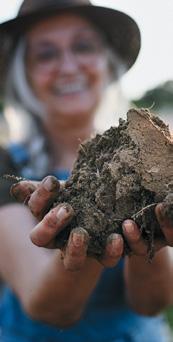
NEM LUI HUE (LEMONGRASS SKEWERS WITH PORK OR CHICKEN)

YIELD: 2 SERVINGS
1 lb ground pork or chicken
1 Tbsp finely minced garlic
1 Tbsp finely minced shallot
½ tsp freshly ground black pepper
12-15 stalks of lemongrass
Salt to taste
Combine all ingredients, except the lemongrass stalks, in a bowl and mix with hands or a fork. Cover and place the mixture in the refrigerator for at least 1 hour (or overnight), allowing the flavors to develop.
Peel the outer layer of the lemongrass stalks. Rinse in water and dry. Take one handful of the ground mixture and wrap it around the end of a lemongrass stalk, gently pressing and molding the meat around the stalk. Repeat with the remaining meat and place on a baking sheet. Grill skewers over coals or on a gas grill for about 6 to 10 minutes until cooked through. Make sure to rub the grill with a paper towel soaked in vegetable oil to ensure the skewers don’t stick to the grate.
CHICKEN CURRY

YIELD: 1 SERVING
1 cup vegetables (mushrooms, leeks, onion or cauliflower), chopped
1 chicken breast, diced
1 tsp turmeric
1 tsp mild or medium curry powder
1 tsp garam masala
½ tsp ground cumin
½ tsp ground ginger
1 garlic clove
Vegetable stock
If using cauliflower, parboil the florets and keep the water they were boiled in. Heat the spices in a dry pan until fragrant. Add garlic and vegetables and coat with spices. Add some oil and pour in some vegetable stock (or the cauliflower water) to deglaze the pan. Cook covered for a few minutes until spices and liquid are well combined and the vegetables are coated evenly. Add the diced chicken. Simmer until the chicken is cooked, stirring regularly. Add more vegetable stock or water for a thinner sauce. Serve with some toasted rye bread to soak up the juices.
Recipes and photos courtesy of Metabolic Balance
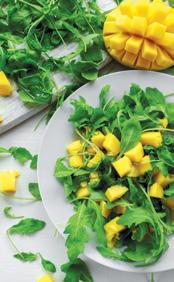
20 Bucks & Montgomery County, PA Edition NABuxMont.com
Bonus Recipe at N ABuxMont.com! ARUGULA SALAD WITH MANGO DRESSING COMING IN JULY
Regenerative










21 June 2023 JUNE: MEN’S HEALTH SERIES Increase Metabolism in 28 Days Keeping Your Eyes Strong as you Age Overcoming the Men’s Health Crisis The 100 Year Lifestyle Alan Christianson, NMD Eric Plasker, DC Bryce Appelbaum, O.D., FCOVD Tracy Gapin, MD, FACS Key Habits to Create Tough Kids and a Lasting Legacy How to Show up as a Leader in Your Home Performing When and How You Want Peak Performance Posture Ben Greenfield Krista Burns, DC Tarin Forbes, DO, ABFM, ABAARM, FAARFM, ABOIM Christopher Smith CHANGE YOUR LIFE AS YOU AGE! Join the most influential and renowned experts in men’s health and personal development! Create tangible next steps and masterfully apply new life skills TODAY! Scan the QR code to JOIN US LIVE ONLI NE Every Tuesday in June at 8pm EDT
Straighten Up and Feel Right
TIPS FOR GOOD POSTURE AND A HEALTHY SPINE
 by Cristina Parker, PT, DPT
by Cristina Parker, PT, DPT
Standing up straight is not just something our parents remind us to do, it also happens to be good for our health. Posture describes the position of the body in space, but the realities of how we stand and move in day-to-day life are much more complex. Healthy postures encourage proper alignment of body structures, while unhealthy postures can lead to a host of issues, including muscle and joint pain, balance impairment and decreased mobility. Awareness of the body’s proper static and dynamic position is essential to maintaining a healthy spine.
The Spine and Its Role in Posture
The body’s main support system is the spine, which consists of three sections. The cervical spine supports the weight of the head and connects it to the shoulders, enabling us to turn
our heads from side to side as well as up and down. The thoracic spine stabilizes the rib cage, which protects the vital organs. The lumbar spine consists of thicker, more robust vertebrae, as they are the main load bearers and enable us to rotate our bodies and bend forward and to the side.
Muscle tightness or joint immobility can shift the spine out of its ideal positioning, causing postural dysfunction. A recent study published in the journal Physical Therapy Rehabilitation Science estimates that 66 percent of the population is living with forward head posture (FHP), a cervical spine dysfunction that occurs when the head moves forward in front of the body. FHP can lead to headaches, migraines and jaw pain. Thoracic kyphosis, a rounded upper back, reportedly impacts 20 to 50 percent of the population and impairs numerous functions, including digestion and breathing. The lumbar spine is at particularly high risk for joint disease as both lumbar muscle strength and pelvic mobility decrease in sedentary individuals. Low back and pelvic immobility are contributing factors for the estimated 103 million individuals worldwide that live with lumbar spinal stenosis, a narrowing of the spinal canal that may cause pain or numbness in the legs.
Three-Step Process to Take Control of Our Posture
STEP ONE: IDENTIFICATION
In her book Rethink Your Position, biomechanist Katy Bowman recommends that we pay attention to a few common signals the body sends out to alert us to an imbalanced weight distribution, including aches in the feet or low back and tension of the shoulders or neck. “Good alignment isn’t about any one fixed position, but a healthy
22 Bucks & Montgomery County, PA Edition NABuxMont.com
fit body N F/peopleimages.com/AdobeStock.com
range of positions,” she says. “By focusing less on memorizing postures and more on learning about load on parts of the body, you can optimize your positioning for many different activities.” Bowman recommends a quick and easy way to self-assess if a postural imbalance is present and, if so, to identify where the imbalance begins: “The body’s joints stack in a vertical line. You can use a plumb line to indicate where your parts are supposed to be. If you take a string with a weight at the end and drop it down from your shoulder, it should line up with the hip, knee and ankle on the way down.”
STEP TWO: CORRECTION
Dr. Krista Burns, co-author of The Posture Principles and founder of the American Posture Institute, recommends a two-minute exercise routine, performed while standing against a wall, that addresses each segment of the spine. Repeat each exercise five times.
1. Neck retraction: Push the head forward away from the wall as far as possible, then pull it back so the base of the skull contacts the wall. Keep the eyes parallel to the horizon, rather than looking up toward the sky.
2. Posture angel: Stand with the back against the wall, elbows bent and tucked in close to the waist. Keeping the back of the hands against the wall, reach up as far as possible then slowly lower back to starting position. This movement, which is like making a snow
angel while standing, should be felt between the shoulder blades when performed correctly.

3. Pelvic tilt: Arch the back so there is a small space between the wall and the lower spine, then tuck in the tail, flattening the spine against the wall and closing that space. This exercise helps initiate movement into the lower joints.
STEP THREE: MAINTENANCE
The key to maintaining a healthy posture is frequent movement, which can include an hourly stretch break or a bi-hourly rangeof-motion routine to move muscles and joints throughout the day. To make postural exercises a habit, physical therapist and integrative health coach Margie Bissinger recommends pairing an exercise routine with something that is already done multiple times a day–for example, mealtime. “People are busy, so it is hard to always dedicate that mental space to awareness of their head or back position,” she states. “When they pair it with something they’re routinely doing, it becomes a habit, and that is when the mental load of the task starts to go away.”
Cristina Parker holds a doctorate in physical therapy. She is a researcher, health content writer, educator and clinician specializing in neurologic disorders, limb-loss rehabilitation and adaptive sports techniques.
23 June 2023 Return to the natural Cycle of Life – to nourish soil, green a meadow and live on! At Green Meadow, we believe that death is no mere end. In our natural, green cemetery, it’s a continuation, part of the great Cycle of Life – of death and rebirth, regeneration and decay – that turns to make all life possible. To schedule a tour or for more information contact Ed Vogrins: 610-868-4840 | Info@GreenMeadowPA.org 1121 Graham Street • Fountain Hill, PA 18015
Keeping Eyes Sharp A HOLISTIC APPROACH TO VISION HEALTH
by Carrie Jackson
As the windows to the world, our eyes are sensory organs that work overtime. They allow us to take in light, see what is before us and send information for the brain to process. While regular eye exams are important, preventative and proactive maintenance is key to achieving healthy vision.

Dr. Marc Grossman co-founded NaturalEyeCare.com to educate professionals and the public about complementary eye care, which can supplement traditional methods. As both a licensed optometrist and acupuncturist, he believes that the health of the eye depends on the well-being of a person’s entire body. “I treat the person behind the eye, not just the condition. When a patient comes in with glaucoma or a cataract, I look at their history and lifestyle choices to see what could be contributing to it,” he says.
Proper nutrition is crucial for proper eye function. Grossman recommends what he calls a “vision diet” based on the Mediterranean diet, which cuts down on sugar and prioritizes organic, low-
alkaline foods, leafy greens and fresh juices. “Carotenoids, found in red or yellow fruits and vegetables, are vital antioxidants for eye health. They include lutein, the yellow pigment in the macula that protects against certain eye diseases, and zeaxanthin, which helps avoid macular degeneration. These nutrients also absorb harmful blue light and are anti-inflammatory. The presence of free radicals and lack of antioxidants in the eyes is directly related to the incidence of many types of eye disease, including macular degeneration. Consuming antioxidants from food is ideal and can be enhanced with supplements such as CoQ10, omega-3 fatty acids, selenium and curcumin,” Grossman explains.
“Regular aerobic activity combined with meditation or another mindfulness practice is ideal to maintain and even improve vision,” he says. “Thirty minutes of brisk walking or another activity you enjoy four days a week can reduce the risk of cataracts, macular degeneration and other common eye conditions. Qigong,
24 Bucks & Montgomery County, PA Edition NABuxMont.com
healing ways
auremarAdobeStock.com
mindful breathing and yoga help the whole body reset and are low-impact ways to improve circulation.”
Proactively retraining the brain can substantially reduce vision dysfunction.
etry, helps adults and children unlock their highest potential by remediating visual developmental delays that impact reading and learning, honing visual skills to elevate sports performance and reorganizing the “visual brain” after head injuries.
“We need to look at eyesight and vision as separate entities. While eyesight is the ability to simply see things like letters on a chart, vision is how your brain derives meaning from the world around us and directs the appropriate action,” explains the Maryland-based optometrist.
Through individualized vision therapy, Appelbaum’s patients learn how to train their eyes, brain and body to work together more efficiently. “Most functional vision problems are actu ally brain problems, and vision therapy teaches you how to use your eyes to retrain your brain. Through a series of exercises, we enhance skills like movement control and visualization,” he explains. The first step is a thorough evaluation, and then, if indicated, personalized treat ment is prescribed with doctor-supervised sessions in the office that are reinforced with exercises at home.
Appelbaum also helps professional and amateur athletes more accurately connect to their sport through vision. “From an early age we’re told to ‘keep your eye on the ball,’ but not taught how to do that,” Appelbaum asserts. “Sports vision therapy trains athletes to optimize critical components in their visual processing and reaction. We work with baseball and basketball players, gymnasts, skiers, even fencers who learn to coordinate and visualize the op timal movement in relation to their environment, equipment and teammates. With repeated exercises and self-correction, athletes learn to enhance visual reaction time, depth perception, visuospatial knowledge and hand-eye coordination."
Monitoring screen time is vital to resting overworked eyes. “As a direct result of excessive screen time, we’re seeing a dramatic increase of nearsightedness in young children, as well as headaches, fatigue, eyestrain and motion sensitivity,” Appelbaum says. “I encourage patients to follow the 20/20/20 rule and take a minimum of a 20-second break every 20 minutes to look at something at least 20 feet away. This allows both the brain and eyes to disengage from the near visual stress and relax. In general, looking at larger screens that are further away will also lessen the strain.”
Taking a holistic approach to overall health and wellness will not only preserve but can also enhance our ability to see. “People should discuss visual issues and symptoms with their doctor and seek out functional vision testing, as vision could be the limiting factor in a number of conditions,” Appelbaum advises. “With mindful visual training and healthy lifestyle choices, we can maximize our vision and our life’s potential.”
Carrie Jackson is a Chicago-based freelance writer and frequent contributor to Natural Awakenings magazine. Connect at Carrie JacksonWrites.com.
Marcelle Pick Tried every diet plan? Not losing weight, no matter what you do? Do you lose weight and gain it back the next year? IT’S NOT YOUR FAULT!
Hormones, Adrenals, and Digestion play havoc with your metabolic system making it impossible to get the weight off.
I have the solution for losing up to 1 pound of fat a day. And, it works! 99% of the women in my Program lose 20 pounds in the first 6 weeks and keep it off!
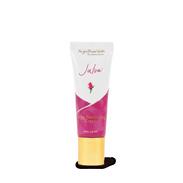
If you are ready to get your body back, feel good in clothes again and increase your self-esteem, apply for a free call to see if we are a fit.


Ready to take steps to change this? Book a Drop20 in 6TM call with me at: https://marcellepick.com/drop20-in-6
Marcelle Pick, OB GYN, NP

25 June 2023
Leaps and Bounds
KEEPING CANINE JUMPERS INJURY-FREE
by Karen Shaw Becker, DVM
Dogs are natural athletes that leap on and off things multiple times a day, usually without incident. That’s why many people don’t realize that, like humans, dogs can sustain injuries, including soft tissue trauma, such as cuts and bruises; back injuries or slipped vertebral discs; sprains; and broken legs.

Preventing Mishaps in a Jumper
Most active dogs that frolic outdoors will get the occasional scrape, cut or bruise. These common (usually minor) injuries can be prevented by ensuring that the areas they frequent are safe, contained and hazard-free. Broken legs, on the other hand, are more serious and typically do not result from normal, or even vigorous, high-intensity exercise. Bone fractures are generally caused by a sudden impact or great force to the body, such as being hit by a car or falling a long distance. They are most often seen in older pets and excitable risk-takers. The best way to prevent a dog from breaking a leg is to make sure it is under control at all times, especially outdoors.
Getting Dogs in Shape to Avoid Injuries
Back injuries, slipped discs and sprains, including canine cruciate ligament injuries, often occur in poorly conditioned dogs. For example, if a pup has been indoors most of the winter, its muscles have lost tone and atrophied. This also applies to “weekend warriors” that exercise and play at high intensity with their owners only on Saturdays and Sundays.
Studies show that well-conditioned muscles can begin to lose their tone and strength in a matter of days. This can set the stage for an injury if the activity level suddenly jumps significantly, so start by gradually improving a dog’s fitness level. The minimum amount of exercise needed to maintain muscle tone is 20 minutes three times weekly, and as pets age, this amount increases. Aim for 40 minutes of rigorous walking or running every day. Consistency is essential for a dog’s muscles and ligaments to stay strong and resilient. This will keep the dog fit and better able to avoid strains, sprains and other injuries. Warming up before exercise is very important. Walk and encourage the dog to stretch its limbs before engaging in more intense exercise, especially with aging dogs.
26 Bucks & Montgomery County, PA Edition NABuxMont.com New AfricaAdobeStock.com
natural pet
Avoiding Cervical Disc and Neck Injuries



Cervical disc and neck injuries are often the result of collar strain. Dogs should be trained to walk beside their handler and heel on the leash. However, even the most well-trained dog will occasionally jump forward suddenly, causing the collar to pull tightly against their neck.

As dogs leap forward in excitement, they pull all the slack out of the leash and apply a great deal of pressure from the collar to their neck and cervical area, potentially resulting in an injury to the cervical disc or other neck problems. Symptoms can include a hesitance to move or lower the neck to eat or drink, and crying outbursts when the head or neck area are touched. Occasionally there can also be lameness in a front leg with this type of injury. For dogs that habitually pull and whose leash behavior isn’t able to be improved, a harness, Gentle Leader-type head collar or other similar equipment can help distribute the dog’s body weight evenly across the restraint and alleviate the pressure on their neck.

Maintaining an Exercise Regimen

If a dog’s leg muscles aren’t toned, if its tendons and ligaments aren’t stretched and strong, and if its core muscles haven’t been worked and can’t do a good job holding the frame solidly in place, then a sudden burst of activity, even at home, can lead to injuries.


Depending on the geographical location, it is much easier to keep a dog fit during spring and summer months, but the goal should be to keep them exercised year-round. If harsh winters discourage outdoor activities, consider visiting an indoor dog park; exposing them to hydrotherapy or a warm-water dog pool; enrolling them in indoor agility, track training or nose work (a growing sport that encourages dogs to follow their natural hunting instincts); or taking them out on a cross-country skiing adventure.
Veterinarian Karen Shaw Becker has spent her career empowering animal guardians to make knowledgeable decisions to extend the life and well-being of their animals. To learn more, visit DrKarenBecker.com.
27 June 2023
The Hair for Life Center Regain A Full Head Of Hair! without Needling, Injectables or Lasers 120 County Rd., Suite 102, Tenafly, NJ TheHairForLifeCenter.com Call 201-731-3530 Today to Reserve Your Free Private Consultation If you’ve tried other approaches to regain your hair and been disappointed with the results, visit us today for a free consultation. before after We can guarantee you a full, beautiful head of hair in 2 to 3 hours! Results last up to 3 years. Over 30 years experience helping women with hair loss.
Introducing Advertisers to Readers since 1994
& ongoing

JUNE 2023
All calendar events for the July 2023 issue must be received by June 10 and adhere to our guidelines. To submit, visit NABuxMont.com/pages/calendar or email Kathy@NaturalAwakeningsNJ.com for a submission form.

FRIDAY, JUNE 2
Reiki Share – 6:30-8:30pm. All welcomeNo experience necessary. A collaborative healing event where all participate in the energy healing of each other. Healing time is divided equally between each participant. $25. Whole Body Yoga Studio, 103 E. Walnut St., North Wales. 215-661-0510. Whole BodyYogaStudio.com/Workshops.
SATURDAY, JUNE 3
Reiki 1 Comprehensive Healing Training –10am-5pm; in-person or Zoom. Learn this hands-on-healing art and become confident in your ability in energy healing, spiritual awakening-growth, working with soul and guidance, working with clearing, and protecting yourself from taking on energy from others or the environment. Comprehensive and complete professional-level course offers practical healing and energy work teachings in addition to Reiki attunements, meditations, and practice. Led by Janet StraightArrow, Reiki Master, Medical Intuitive, and Shaman, who has taught Reiki for 25 years. $365. Be The Medicine (Online In-Person-SessionsClasses-Retreats), 247 North Road, Chester. 973-647-2500. BetheMedicine.com.
Family Yoga Party – 11:30am-1pm. Fun for the whole family and open to all ages. Includes dance party, yoga practice, games, and snacks. Bring your yoga mats and get ready to have fun. $35 per family. Whole Body Yoga Studio, 103 E. Walnut St., North Wales. 215-661-0510. WholeBodyYoga Studio.com/Workshops.
WEDNESDAY, JUNE 7
New Solutions For Chronic Joint Pain –12:30-2pm. Spots are limited and registration is required! Lunch and Learn presentation begins at 12:30 pm so please arrive a few minutes beforehand to find our office and grab your seat. Lunch will be provided. Call our office today to reserve your spot, and bring one guest! Free. Dr. Lachman & Associates, 1432 Easton Rd, Warrington. 267-406-0782. DrLachman.com.
FRIDAY, JUNE 9
Feng Shui Professional Certification Program – 12noon. Become certified and accredited as a Feng Shui Professional. Join Master Teachers Renae Jensen and Mary Dennis for this step-by-step personalized, hands-on training intensive. Mention Natural Awakenings for a $100 discount. For information, email RenaeJensen@gmail.com or visit FengShuiMorristown.com. FengShui Morristown.com.

Groove Dance Workshop – 7:30-8:30pm. No experience or skill needed. We come together to unite, celebrate, connect, play, heal, and get healthy through dance. A creative group dance experience with great music, come have fun!. $25. Whole Body Yoga Studio, 103 E. Walnut St., North Wales. 215-661-0510. WholeBodyYogaStudio.com/Workshops.
SATURDAY, JUNE 10
Kitchen Medicine – 1-3pm. Come explore all the benefits sage, rosemary, and thyme want to share with us! During this workshop you will harvest and create a sage tincture and a rosemary hair tonic. Learn how to infuse oils for culinary and topical uses. Join us for a fun and aromatic afternoon. $50. Mad Lavender Farm, 452 Co Rd 579, Milford. 908-3105973. MadLavenderFarm.com/workshops/ workshops.
TUESDAY, JUNE 13
Pranayama Workshop – 6:30-8pm. Explore how breathing techniques can bring power over our mind and connect us to our body’s energies. Learn to use your breath as a tool in your mindfulness practice. $35. Whole Body Yoga Studio, 103 E. Walnut St., North Wales. 215-661-0510. WholeBodyYogaStudio. com/Workshops.
SATURDAY, JUNE 17
Comprehensive Reiki Master HealerTeacher Training – 10am-5pm. Learn Mastery level awareness, healing, and teaching and experience all levels of Reiki from a Mastery perspective as we work on one another. Be curious, open, and ready to go beyond anywhere you imagined healing, and Mastery would take you. This is open to sincere students from all Reiki traditions. Class schedule will be set to accommodate students. $2000; payment plan available. Be The Medicine (Online In-Person-SessionsClasses-Retreats), 247 North Road, Chester. 973-647-2500. BeTheMedicine.com.

English Lavender Wreath Workshop in June – 1-3pm. As a part of our workshop, you will pick some lavender right out of the field. It takes a LOT of lavender to create this, and so the lion’s share of it will be fresh cut and ready for you to fashion into your wreath. There is nothing like the color and scent of fresh lavender and it will dry beautifully, lasting well into the next year. Nicole will guide you to adhere it properly and distribute it nicely around your 12inch wreath support. Lavender lemonade and lavender shortbread cookies will be served to nibble and sip. Be sure to take the time to enjoy a stroll around the farm. It is the most beautiful time of year! This workshop is limited to 8 attendees. In the event of rain, the workshop will be held in our new renovated Workshop Space. $150. Mad Lavender Farm, 452 Co Rd 579, Milford. 908-310-5973. MadLavenderFarm.com/ workshops/workshops.
Restorative Yoga & Sound Healing –1-2:30pm. A blissful afternoon of live sound healing including gongs, crystal sound bowls, and bells, while being led in a luxurious restorative yoga practice accompanied by essential oils. $45. Whole Body Yoga Studio, 103 E. Walnut St., North Wales. 215661-0510. WholeBodyYogaStudio.com/ Workshops.
28 Bucks & Montgomery County, PA Edition NABuxMont.com
daily
SUNDAY, JUNE 18
Philly’s Juneteenth Celebration – 12noon8pm. The annual Philly’s Juneteenth celebration will shine brightly in West Philadelphia with carnival-style fun – a parade, children’s village, marketplace with artwork and 250 vendors, festive cultural floats, kid’s activities, and a music festival featuring house vocalist Lady Alma and others on various stages. Free entrance. Most events will be at Malcolm X Park, 52nd and Pine Streets, and along 52nd Street, including the music festival near Larchwood Street. For info, visit JuneteenthPhilly.org.
TUESDAY, JUNE 27

New Solutions For Chronic Joint Pain –12:30-2pm. Spots are limited and registration is required! Lunch and Learn presentation begins at 12:30 pm so please arrive a few minutes beforehand to find our office and grab your seat. Lunch will be provided. Call our office today to reserve your spot, and bring one guest! Free. Dr. Lachman & Associates, 1432 Easton Rd, Warrington. 267-406-0782. DrLachman.com.
plan ahead
SATURDAY, JULY 8
Mushroom Cultivation Workshop – July –1-3pm. Are you interested in learning more about mushrooms? Join mushroom cultivators and foragers Jeff Mertz and Kacy Binz in a fun and hands-on mushroom cultivation workshop! Kacy and Jeff will walk you through each step of the growing process, from mycelium to mushroom. They will lead the group in an inoculation of blue oyster mushrooms, and you will leave with your own at home mushroom growing kit! You will also learn about the phenomenal health benefits of mushrooms as well as some tasty recipes to introduce wild mushrooms more into your diet. They will also have some tips and advice for those interested in wild foraging. Mushroom snacks and tea will be provided, as well as print outs of all the information. . $65. Mad Lavender Farm, 452 Co Rd 579, Milford. 908-310-5973. MadLavenderFarm. com/workshops/workshops

SUNDAY, JULY 23
Elderflower and Yarrow Workshop- July – 1-3pm. Elderberry and Yarrow bestow us with their lacy blossoms in July. During this workshop we will explore the magic and medicine of Elderflower and Yarrow, visiting the flowers in our garden and harvesting some for our medicine making! Both blossoms are full of beneficial properties from
nourishing our skin, moving fevers, soothing colds and so much more! During this workshop we will spend time in the garden with Elder and Yarrow then to our workshop to create a facial toner as well as a tea blend to take home. You will leave with additional recipes and ritual work to further explore your connection to Elder and Yarrow. . $45. Mad Lavender Farm, 452 Co Rd 579, Milford. 908-310-5973. MadLavenderFarm.com/ workshops/workshops.
MONDAY, AUGUST 14
Five Secrets to Lowering Your Blood Sugar



Your Doctor Never Told You – 12:30-2pm. Spots are limited and registration is required! Lunch and Learn presentation begins at 12:30 pm so please arrive a few minutes beforehand to find our office and grab your seat. Lunch will be provided. Call our office today to reserve your spot, and bring one guest! Free. Dr. Lachman & Associates, 1432 Easton Rd, Warrington. 267-406-0782. DrLachman.com.
ongoing
monday
Prenatal Yoga Classes – 6-7pm. Designed to nourish expectant mothers during their journey, students will learn to connect with their own innate wisdom, body, and growing baby. Strengthen pelvic muscles, improve circulation, and increase comfort. $25 per class/ $130 for 6 classes. Whole Body Yoga Studio, 103 E. Walnut St., North Wales. 215661-0510. WholeBodyYogaStudio.com/ class-descriptions/north-wales-prenatalyoga.
tuesday
Mommy & Me Yoga Class – 11:30am12:30pm. A fun and healthy practice for postpartum moms and babies, and a great way to connect with your little one. This class is good for infant to crawlers. Every Tuesday. $25. Whole Body Yoga Studio, 103 E. Walnut St., North Wales. 215-661-0510. Whole BodyYogaStudio.com/schedule.

thursday
Kids Yoga & Mindfulness Class – 4:305:15pm. This class will include simple breath styles & postures, games, stories, & more. Learn about yoga in a fun & creative atmosphere with friends. Every Thursday until June 8. $20 for 1 class - $100 for 6. Whole Body Yoga Studio, 103 E. Walnut St., North Wales. 215-661-0510. WholeBodyYogaStudio.com/schedule.
29 June 2023
2023 EDITORIAL CALENDAR 908-405-1515 JULY REGENERATIVE ORGANIC FARMING AUGUST BACK TO SCHOOL SEPTEMBER WELLNESS TRAVEL OCTOBER TRADITIONAL WORLD MEDICINE NOVEMBER ECO-LIVING DECEMBER HOLIDAY & UPLIFTING HUMANITY FREE Location-Edition HEALTHY LIVING HEALTHY PLANET 10 FREE January2022 Location-Edition NaturalAwakenings.com HEALTHY LIVING HEALTHY PLANET YourHealthyAlternativesto MorningCupofJava TrackerstoHelpLower YourCarbonFootprint FREE January 2022 Location-Edition NaturalAwakenings.com HEALTHY LIVING HEALTHY PLANET FITNESS TRENDS FOR 2022 TOP10 Plant-Based Coffee Alternatives The Deep Power of Words Why Electric Cars are Gaining Ground Ultimate vulnerability. That’s manly. ~Cameron Conaway
Bucks/Montgomery Community
business directory

Your local source for natural health, nutrition, fitness, personal growth, green living, creative expression and the products and services that support a healthy lifestyle
Chiropractic Center for Natural Healing
Jeffrey L Griffin, DC
252 W Swamp Rd, Ste 26, Doylestown 215-348-2115 • C4NH.com
Dr.griffin@c4nh.com
Life is full of symptoms stemming from just one cause…MEN!
Mechanical, Emotional and Nutritional Stress. Well-studied, documented and very treatable provided the cause is known. That’s where we come in. Let our 37 yrs of experience help you begin feeling better today! Free phone consultation available when you mention Natural Awakenings magazine! See ad, page 19
Dentistry - Holistic
Lanap & Implant Center of PA
David DiGiallorenzo, DMD
Henry Hsu, DMD
184 W Main St, Collegeville 610-409-6064 • PerioImplants.us
Providing oral health solutions through holistic, biologically compatible and organic practices. One of the world's most accomplished centers for periodontal and implant care, which integrates wellness services into their therapeutic approach. Experience with immediate total tooth replacement with metal-free dental implants, treating gum disease with LANAP, a no-cut, no-sew method of treating gum disease, comfortable gum grafting with PRGF, implant denture solutions, and chronic pain management. See ad, page 13
Whole Body Yoga Studio

103 E Walnut St, N Wales 215-661-0510
WholeBodyYogaStudio.com
Energy Practitioner & Coach
Full Circle Energy Therapies
Lori L Hoff
1105 Taylorsville Rd, Washington Xing 908-268-7169
FeelsLikeSunshine124@gmail.com FullCircleEnergy.net
Taking energetic support to another level. Full Circle Energy Therapies is here to guide you with simple, gentle, effective tools. This is the sign you’ve been looking for. See ad, page 11
Enzyme Nutrition
Center for Natural Healing
Jeffrey L Griffin, DC 252 W Swamp Rd, Ste 26, Doylestown 215-348-2115 • C4NH.com Dr.griffin@c4nh.com


Feeling poorly? Lacking answers? Frustrated by your health issues? I understand and want to help. Mention Natural Awakenings magazine and receive your exploratory phone consultation with Dr. Griffin completely free of charge. New patients welcome! See ad, page 19
Hair Restoration
The Hair For Life Center, LLC
201-731-3530
TheHairForLifeCenter.com
For over 35 years The Hair For Life Center has been helping women who experience hair loss. In as little as 2 to 3 hours we restore your hair to its natural state safely without using glues or extensions. For more information, visit at TheHairForLifeCenter. com. See ad, page 27

Health & Holistic Healing
Heart Flowers Healing Therapies

Linda Lemire, LMT, CST 713 Kellers Church Rd, Ottsville 215-534-6138 • LLemire@Comcast.net
I work very intuitively and sense what is needed and when other therapies need to be a part of each session. CranioSacral Therapy, Manual Lymph Drain, Polarity Therapy, Reiki, Herbalism and Reflexology are brought into each session regularly to best bring a higher expression of health and well-being.
Integrated Medicine
Lachman and Associates

Julie Lachman, ND LLC


1432 Easton Rd. Suite 3G, Warrington 267-406-0782 • DRLachman.com
Lachman and Associates is a full-service integrated practice. Our naturopathic doctor is an expert in chronic, difficult and autoimmune diseases. She also supports those with diabetes, hormonal and menopausal concerns. Our medical team specializes in non-surgical arthritis care as well as non-surgical facelifts. Voted “Best in Bucks County for Family Medicine”.
Life Coaching – Gestalt
Step Into Joy Healing Arts
Joan Summers, Certified Gestalt Coach, Trauma Professional and Reiki Master 267-272-9343 • StepIntoJoyHealingArts.com


Joan@StepIntoJoyHealingArts.com
Experience deep and long-lasting healing. Joan offers healing for her clients who are tired of feeling stuck, disconnected or without purpose. She offers Gestalt Life Coaching, Equine Gestalt Life Coaching and reiki, and you may choose to customize your session. See ad, page 9

30 Bucks & Montgomery County, PA Edition NABuxMont.com
Journey To The Self

Linda Harbaugh, Intuitive Medium Certified Life Coach/Reiki Practitioner



Linda@JourneyToTheSelf.com
JourneyToTheSelf.com • 484-904-9268
Delivering messages of love and guidance from deceased loved ones and spirit guides via readings and intuitive reiki sessions. A certified life coach, Linda also offers intuitive coaching packages to help you navigate life, jobs and relationships. Psychology degree, former teacher, 30 years business experience. Telephone or in person.

Pranic Healing
Dan McMeans
267-570-9042
HopeForYou1978@yahoo.com
HolisticPranicHealer.com

Pranic healing can treat possible malignant tumors, pneumonia, stress, depression and sports injuries. This type of healing influences your natural life force to bring about healthier living body.

See ad, page 5.
Reiki
Step Into Joy Healing Arts
Joan Summers, Certified Intuitive Reiki Master and Gestalt Coach 267-272-9343 • StepIntoJoyHealingArts.com
Joan@StepIntoJoyHealingArts.com
Experience peace of mind, enlightened awareness and physical restoration. The connections between physical pain and emotional trauma are often revealed during an intuitive reiki session. It is a practice of compassion and spiritual connection. See ad, page 9


31 June 2023
included IN THIS SECTION 908-405-1515 find out how to be
WEB EXCLUSIVE at NABuxMont.com! BAREFOOT BLESSINGS Basking in the Soul of Summer EDITORIAL CALENDAR & MARKETING PLANNER Natural Awakenings | 908-405-1515 | NABuxMont.com September WELLNESS TRAVEL August BACK TO SCHOOL July REGENERATIVE ORGANIC FARMING
If staying in the game
is a priority, Call 609-570-6980
Regenerative Medicine utilizes your own cells, including Platelet Rich Plasma (PRP) to facilitate your body’s natural ability to heal from orthopedic and spine problems that were previously treated with steroids and surgery.

We specialize in treating pain in the spine and joints including osteoarthritis. With minimal down time, Regenerative Medicine can help you return to work, sports and activities quickly.


609-570-6980 | info@regenespine.com Offices in Mercerville and Cedar Knolls, NJ & NYC. RegeneSpine.com Stay In The Game with Regenerative Medicine
not just for professional athletes any more.
It’s
Today to schedule a
For over 15 years, Dr. Roman has provided care to thousands of patients including professional athletes with various spine and joint disorders, arthritis, and pain issues. informational
free
call. Stephen J. Roman, Jr.,
M.D.


































 by Carrie Jackson
by Carrie Jackson






































 by Julie Peterson
by Julie Peterson






















 by Cristina Parker, PT, DPT
by Cristina Parker, PT, DPT










































